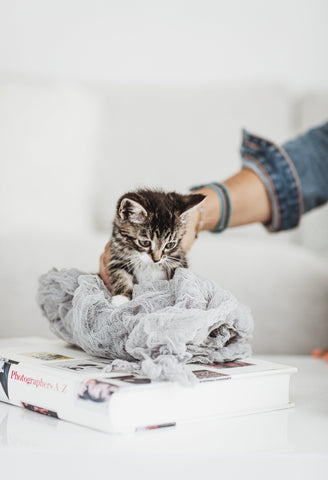What Are Allergies In Cats?
Cat allergies arise from the immune system's heightened sensitivity to specific substances, which trigger allergic reactions. These starting substances, termed allergens, are generally non-harmful elements like pollen, certain foods, or dust. Yet, in some cats, these allergens cause an exaggerated immune response, leading to allergy symptoms.
For humans, allergies might manifest as sneezing, watery and itchy eyes, or a runny nose. In cats, however, allergic reactions can affect multiple bodily systems:
Skin: Affected cats might excessively lick, bite, or scratch their skin, possibly leading to infections and fur loss. The skin is often the primary target of feline allergies.
Digestive System: Allergic reactions might cause symptoms such as vomiting or diarrhea in cats.
Respiratory System: This can involve upper and lower airways, frequently resulting in nasal discharge.
Eyes: Allergens can trigger conditions like conjunctivitis.
Cat allergies are a prevalent issue, often presenting lifelong challenges that can affect the well-being of both the cat and the cat owner. Though certain breeds might be more predisposed, allergies can affect any cat. Timely action is crucial for managing this condition. If you suspect your cat is exhibiting allergy symptoms, consult your veterinarian promptly.
Types Of Allergies In Cats
"Allergy" is a broad term. When diagnosing cats, veterinarians typically identify the following six predominant allergic reactions:
- Food Allergy
- Atopic Dermatitis
- Flea Allergy Dermatitis
- Allergic Contact Dermatitis
- Skin Reactions to Medications
- Respiratory Allergies (Asthma)
Causes Of Allergies In Cats
The exact reasons behind food allergies in cats remain a mystery. While various elements like proteins, carbohydrates, preservatives, additives, or colorings can potentially cause allergies, proteins often overactivate a cat's immune system. Beef, fish, and chicken are among the top culprits. Though some cats might react to grains, corn, or gluten, these instances are rarer than allergies from primary protein sources. Some research suggests that Siamese cats and felines younger than six months might be more prone to food allergies.
Atopic Dermatitis
Environmental allergies, commonly known as atopy, lead to irritated and itchy skin conditions. While the genetic basis isn't thoroughly researched in felines, Abyssinian, Devon Rex, and young domestic short-haired cats below the age of 3 are often more susceptible. Common triggers for atopy include:
- Flowering particles
- Fungal spores
- Various yeast strains
- Dust particles and mites found in storage
- Dander from animals or humans.
Flea allergic dermatitis is a heightened response to the saliva of fleas.
Allergic Contact Dermatitis
Allergic contact dermatitis, while uncommon in felines, arises from a postponed hypersensitive reaction at the point of contact with:
- Vegetation (including pollen, various grasses, and trees)
- Medical products (such as surface treatments, ear treatments, cleansing agents, hair care products, and bug sprays)
- Household items (like fabric materials, colorings, finishing products, and cleaning agents)
- Miscellaneous sources (like grain derivatives and treated water).
Skin Reactions to Medications
Any medication has the potential to trigger a skin-related drug response. This reaction can occur after a single administration or after several dosages. Drugs frequently associated with skin eruptions encompass antibiotics, seizure-controlling medications, blood pressure regulators, NSAIDs, and medications that manage irregular heartbeats.
Respiratory Allergies (Asthma)
Asthma in cats results from their immune system responding excessively to airborne allergens, leading to inflammation and narrowing of the airways. Potential triggers include cigarette smoke, subpar environmental cleanliness, dusty kitty litter, aerosol sprays, molds, pollen, household cleaners, and scented room fresheners.







